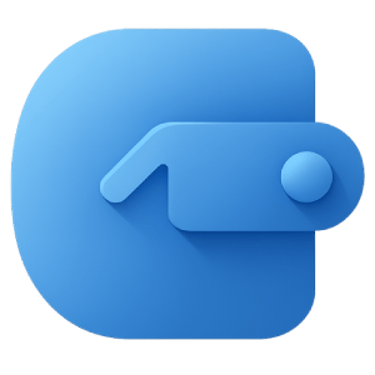Mastering Your Money: The Power of Tracking Your Expenses
10/22/20244 min read


Do you ever feel like your money just disappears, like a magician waving a wand over your paycheck? One minute it's there, the next—poof—it's gone. We've all been there, looking at our bank account at the end of the month and wondering, where did it all go? The truth is, if you don’t know where your money is going, you can’t manage it effectively. Tracking your expenses is the foundation of financial control, and it's the first step toward achieving your financial goals. Let’s dive into how to track your spending, why it matters, and how this simple habit can change the way you manage your money forever.
Step 1: Record Everything You Spend
Yes, I know, this part might sound tedious, but hear me out. To truly understand your spending habits, you need to record every single thing you spend money on for at least one month. That means every coffee, every snack, and every impulse buy on Amazon (we’ve all been there). You’ll be surprised how quickly those small purchases add up.
How to Get Started:
Use a Notebook: If you like the old-school approach, carry a small notebook with you. Every time you spend money, jot it down. It’s simple and effective.
Go Digital: Prefer something a bit more high-tech? Use a budgeting app like Mocy, Mint, or YNAB (You Need A Budget). These apps make it easy to log expenses on the go.
Create a Spreadsheet: For all the spreadsheet lovers out there, build a simple tracking sheet in Google Sheets or Excel. Set up categories like food, transportation, entertainment, etc., and log your expenses daily.
Step 2: Review and Analyze Your Spending Patterns
Now that you’ve tracked your spending for a month, it’s time to take a step back and review the data. This is where the real magic happens. You’ll start to see patterns—some of which might shock you.
Example:
Maybe you’re spending more on takeout than you realized. Sure, that $10 burrito seemed harmless at the time, but after five takeout meals, that’s $50 gone without a second thought. Or maybe your morning coffee run is costing you $100 a month—money that could be better spent or saved.
What to Look For:
Where Are You Overspending?: Is there a category that’s eating up more of your budget than expected? Dining out, entertainment, impulse shopping—these are common culprits.
What’s Non-Essential?: Are there expenses you can cut back on without feeling deprived? Maybe that subscription service you hardly use, or those daily snacks at the gas station.
What’s Surprising?: Sometimes the little things really add up. Did you realize you were spending so much on “small” items like coffee, snacks, or random online shopping?
Step 3: Make Informed Decisions
Once you see the cold, hard numbers in front of you, it’s time to make some informed decisions. This is where tracking your expenses gives you power. You now have the data you need to adjust your spending in a way that aligns with your goals and values.
Questions to Ask Yourself:
Can You Cut Back?: Maybe you realize you don’t need to dine out as often or that you can limit your streaming services to just one or two instead of four. These small changes can free up more cash for your savings or debt payoff goals.
What Matters Most?: Align your spending with what truly matters to you. If travel is important, maybe cut back on unnecessary shopping so you can save for that dream vacation.
Are You Reaching Your Goals?: If one of your financial goals is to save more, then tracking your expenses shows you exactly where you can find that extra money to stash away.
Example:
Let’s say your goal is to save $200 a month. After tracking your expenses, you notice that you’re spending $150 on subscription services and gym memberships you don’t even use. Cutting back on those frees up a significant amount, which you can then allocate toward your savings goal.
Step 4: Adjust Your Budget
With your newfound insights, it’s time to adjust your budget. The purpose of tracking isn’t to make you feel guilty about every purchase but to help you create a budget that works for you. Your budget should reflect your priorities and values, not feel like a punishment.
How to Adjust Your Budget:
Reallocate Funds: If you’re overspending in one area, figure out where you can cut back and redirect that money to something more important, like savings, debt repayment, or even just a little extra fun money.
Build in Flexibility: Life happens, and sometimes expenses come out of nowhere. Make sure your budget includes a buffer for unexpected costs so you’re not caught off guard.
Step 5: Tracking Isn’t Restriction, It’s Empowerment
Let’s debunk a common misconception: tracking your expenses is not about restricting yourself from enjoying life. It’s about control—you decide where your money goes, rather than wondering where it went.
Think of tracking like a GPS for your finances. You wouldn’t drive cross-country without knowing the route, right? The same goes for your money. Tracking expenses shows you the roadmap to reach your financial goals while still allowing room for the things that bring you joy.
Humor Moment:
Let’s be honest—tracking expenses can be a little like finding out how many calories are in your favorite dessert. You don’t want to know, but once you do, you can make better decisions. (But hey, you can still have that dessert once in a while!)
Step 6: Stay Consistent and Keep Tracking
Now that you’ve gone through one month of tracking, keep going! The more consistent you are, the better you’ll understand your financial habits, and the easier it will be to stay on top of your budget.
Tip:
Review your spending weekly, so you can catch any problem areas early. You don’t want to wait until the end of the month to realize you’ve blown your entertainment budget halfway through.
Final Thoughts: Knowledge is Power
In the world of personal finance, knowledge truly is power. By tracking your expenses, you’re not just watching where your money goes; you’re taking control of your financial future. You’ll be able to make informed decisions, align your spending with your goals, and ultimately live a life that reflects your values.
So, grab that notebook, app, or spreadsheet and start tracking. Your future self will thank you when you’re sipping a margarita on a beach, knowing your finances are under control. (And yes, you can budget for that margarita!) Happy tracking!
Manage your expenses effortlessly with AI. Track spending via voice, photos, and personalized strategies to save time and money.
Contacts
+84857001789
© 2024. All rights reserved.
